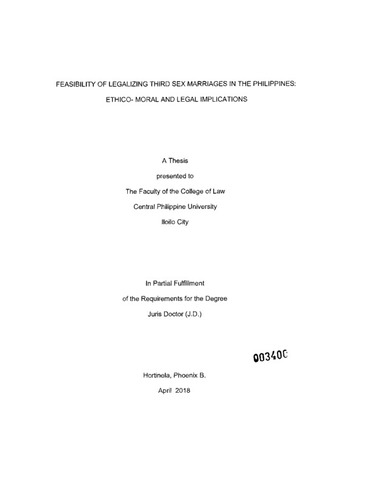Feasibility of legalizing third sex marriages in the Philippines: Ethico-moral and legal implications
| dc.contributor.adviser | Alibogha, Salex E. | |
| dc.contributor.author | Hortinela, Phoenix B. | |
| dc.coverage.spatial | Philippines | en_US |
| dc.date.accessioned | 2021-06-30T07:08:08Z | |
| dc.date.available | 2021-06-30T07:08:08Z | |
| dc.date.issued | 2018 | |
| dc.identifier.citation | Hortinela, P. B. (2018). Feasibility of legalizing third sex marriages in the Philippines: Ethico-moral and legal implications (Unpublished postgraduate thesis). Central Philippine University, Jaro, Iloilo City. | en_US |
| dc.identifier.uri | https://hdl.handle.net/20.500.12852/1134 | |
| dc.description | Abstract only | en_US |
| dc.description.abstract | This descriptive-correlational study, conducted in February 2017, aimed at ascertaining the feasibility of legalizing third sex marriages in the Philippines, as well as its ethical, moral and legal implications. It likewise aimed to ascertain the respondents’ knowledge about the provisions of marriage in Philippine law, the perception about legalizing third sex marriage, the intent to engage in third sex marriage and the feasibility of legalizing third sex marriage. Fifty (50) law students of Central Philippine University College of Law participated in the study. One (1) self-made questionnaire data-gathering was utilized to obtain data for the study. Mean, frequency, and standard deviation were employed as descriptive statistics. Wilcoxon Mann Whitney U Test and Pearson Product Moment Co-efficient of Correlation were employed for inferential statistics. All statistical computations were computer-processed using the Statistical Package for the Social Sciences (SPSS) Software. Results showed that, generally, same sex marriage is not a constitutional issue. No constitutional provision prohibits the marriage between two persons of the same sex, rather only a statutory provision in Article 1 of Executive Order No. 209 which limits marriage between a man and a woman. Likewise, the respondents have a positive perception on legalizing same sex marriage in the Philippines, they had high knowledgeable of the laws and jurisprudence governing marriage in the Philippines, and the respondents are most likely to engage in same sex marriage when legalized. Finally, perception on same sex marriage, knowledge on laws related to marriage and intention to engage in the same were positively and highly correlated. The higher the knowledge on laws governing marriage, the more positive their perception is towards same sex marriage, and the most likely they are to engaged in same sex marriage. | en_US |
| dc.format.extent | xii, 77 leaves | en_US |
| dc.language.iso | en | en_US |
| dc.rights | Attribution-NonCommercial-NoDerivs 3.0 Philippines | * |
| dc.rights.uri | http://creativecommons.org/licenses/by-nc-nd/3.0/ph/ | * |
| dc.subject.ddc | Law Library 340.72 H789 2018 | en_US |
| dc.subject.lcsh | Same-sex marriage | en_US |
| dc.subject.lcsh | Same-sex marriage--Law and legislation | en_US |
| dc.subject.lcsh | Central Philippine University--Students | en_US |
| dc.subject.lcsh | Law students | en_US |
| dc.subject.lcsh | Same-sex marriage--Moral and ethical aspects | en_US |
| dc.subject.lcsh | Philippines | en_US |
| dc.title | Feasibility of legalizing third sex marriages in the Philippines: Ethico-moral and legal implications | en_US |
| dc.type | Thesis | en_US |
| dc.description.bibliographicalreferences | Includes bibliographical references | en_US |
| dc.contributor.chair | Bedona, Zacarias D. Jr. | |
| dc.contributor.department | College of Law | en_US |
| dc.description.degree | Juris Doctor | en_US |
Fichier(s) constituant ce document
Ce document figure dans la(les) collection(s) suivante(s)
-
Juris Doctor [144]



